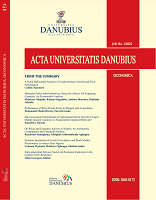Causality Evidence of Exchange Rate - Stock Price Relation in Nigeria: Symmetric and Asymmetric Approach
Causality Evidence of Exchange Rate - Stock Price Relation in Nigeria: Symmetric and Asymmetric Approach
Author(s): Adedeji Daniel GbadeboSubject(s): International relations/trade, Financial Markets, Public Finances
Published by: Editura Universitară Danubius
Keywords: Asymmetric causality; Granger causality; Symmetric causality; Negative cumulative component; Positive cumulative component;
Summary/Abstract: Foreign exchanges and stocks are the two most traded financial assets in the world. The causality between their prices remains subject of research. The contention often follows that it is the exchange rate that drives stock price, according to the flow-oriented models or that the stock price drives exchange rates based on the stock-oriented models. I used available data from Nigeria to explore the Granger causality between them based on the symmetric approach, from Toda-Yamamoto (1995) and the asymmetric approach for handling connectedness for ergodic variables with deterministic trends, from Hatemi-J (2012). The test completed identifies that the two considered series are integrated. The results from the symmetric method recognise causality from exchange rate to the stock price with no potential Granger-causal feedback. I transform the integrated series into negative and positive cumulative fragments, and complete the asymmetric test using the Wald statistic to verify the likelihood of lopsided causality. The results identify that allowing for asymmetry, and in particular, positive shocks in the exchange rate can cause a positive shock in share price, and not vice versa. Also, negative shocks in the exchange rate would not cause a negative shock in share price. This implies that any depreciation or devaluation of the naira would motivate investors to increase their participation in the stock market. This finding has implication to the different stakeholders, including government, regulators and markets traders, in the Nigerian context.
Journal: Acta Universitatis Danubius. Œconomica
- Issue Year: 19/2023
- Issue No: 4
- Page Range: 193-209
- Page Count: 17
- Language: English

